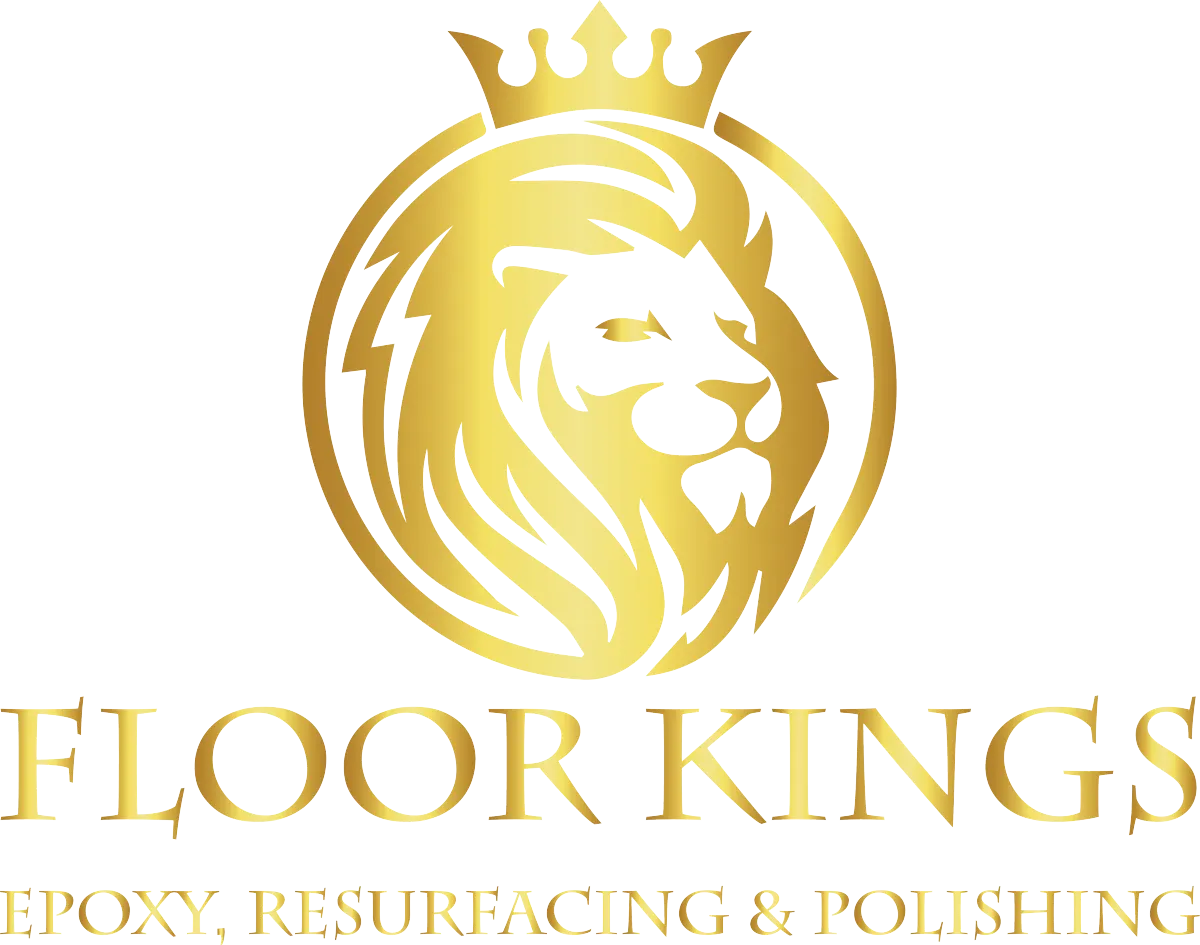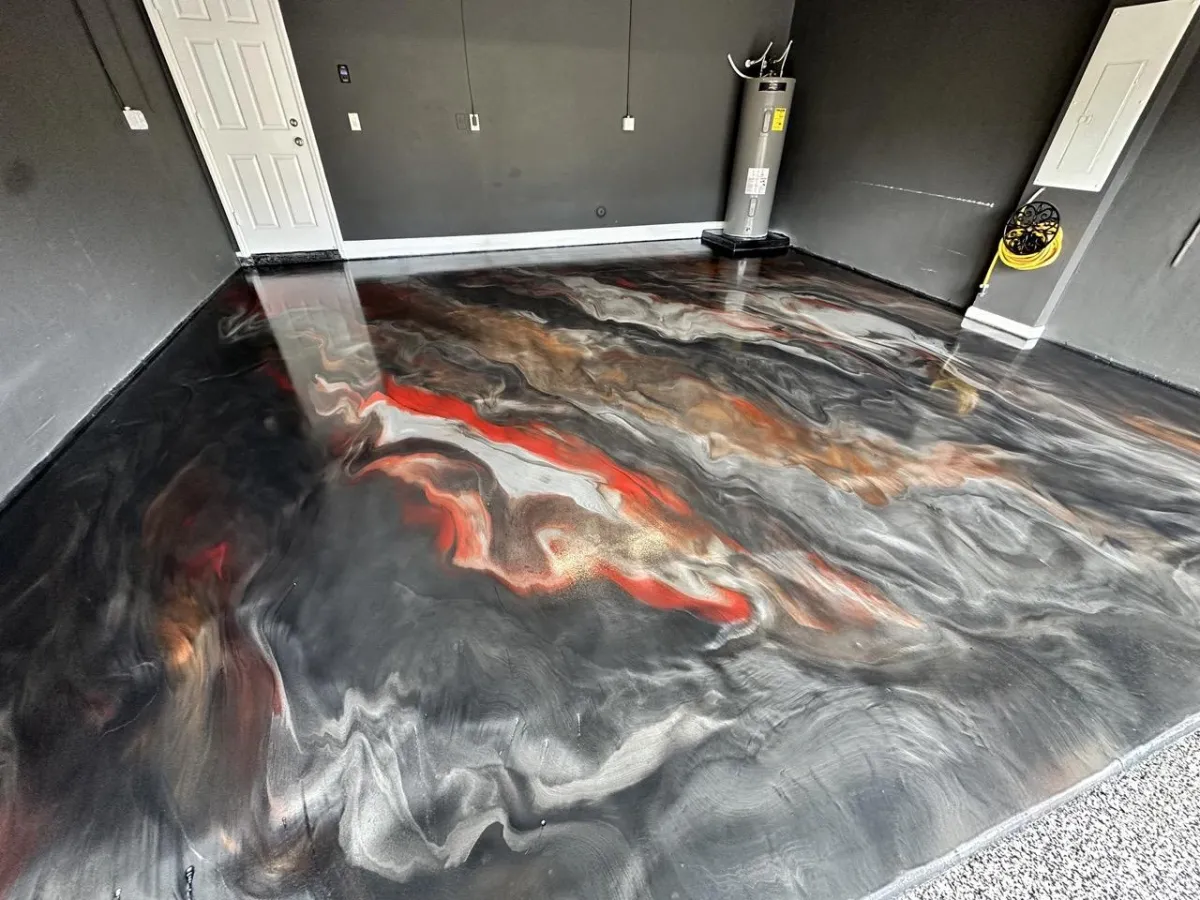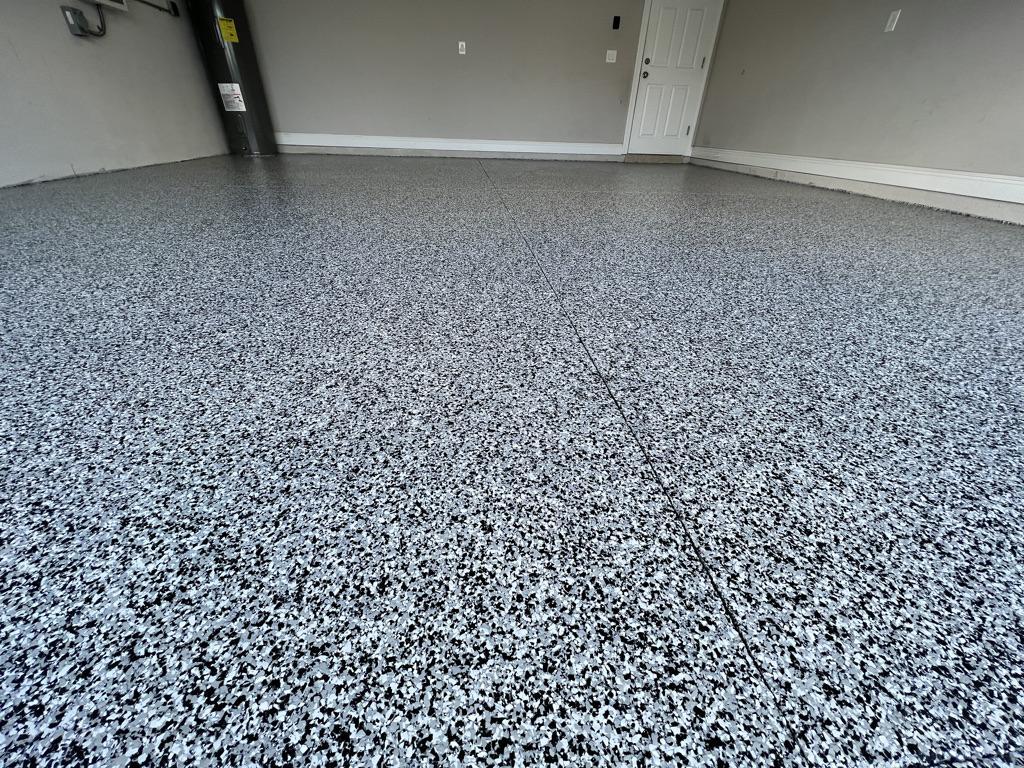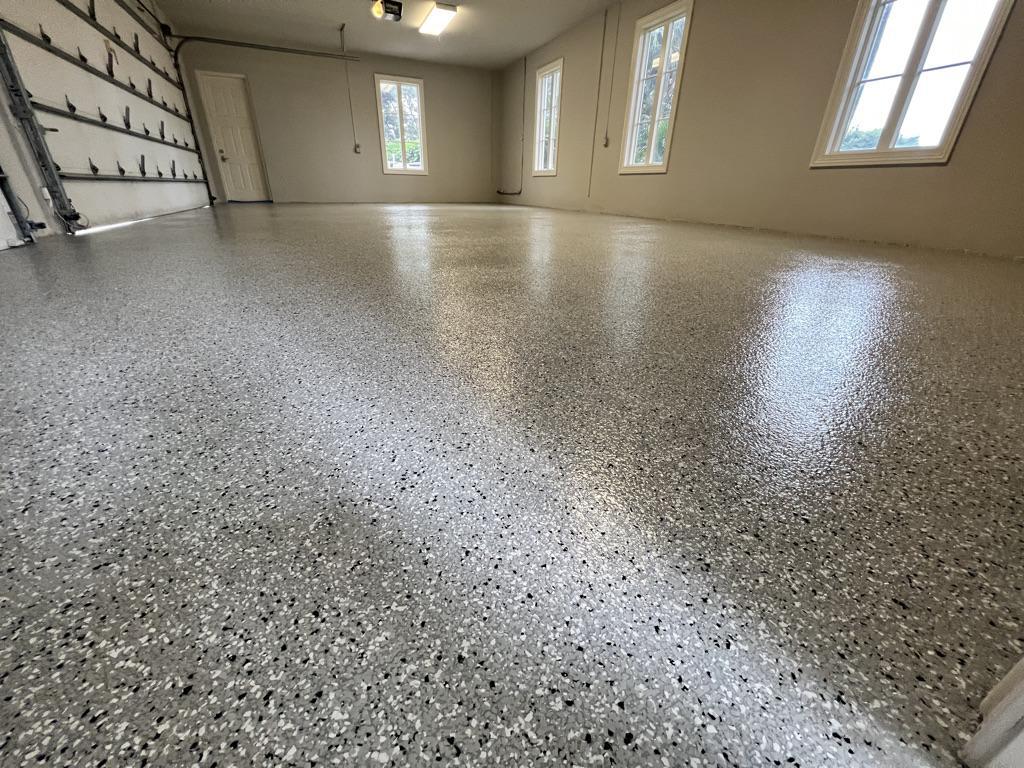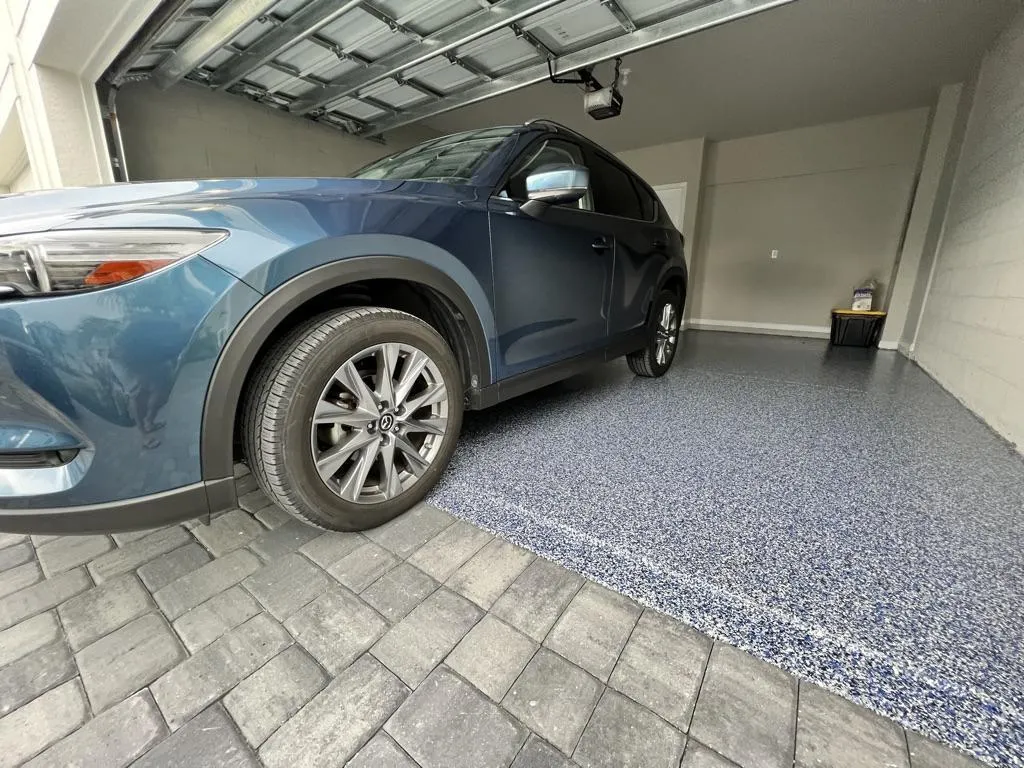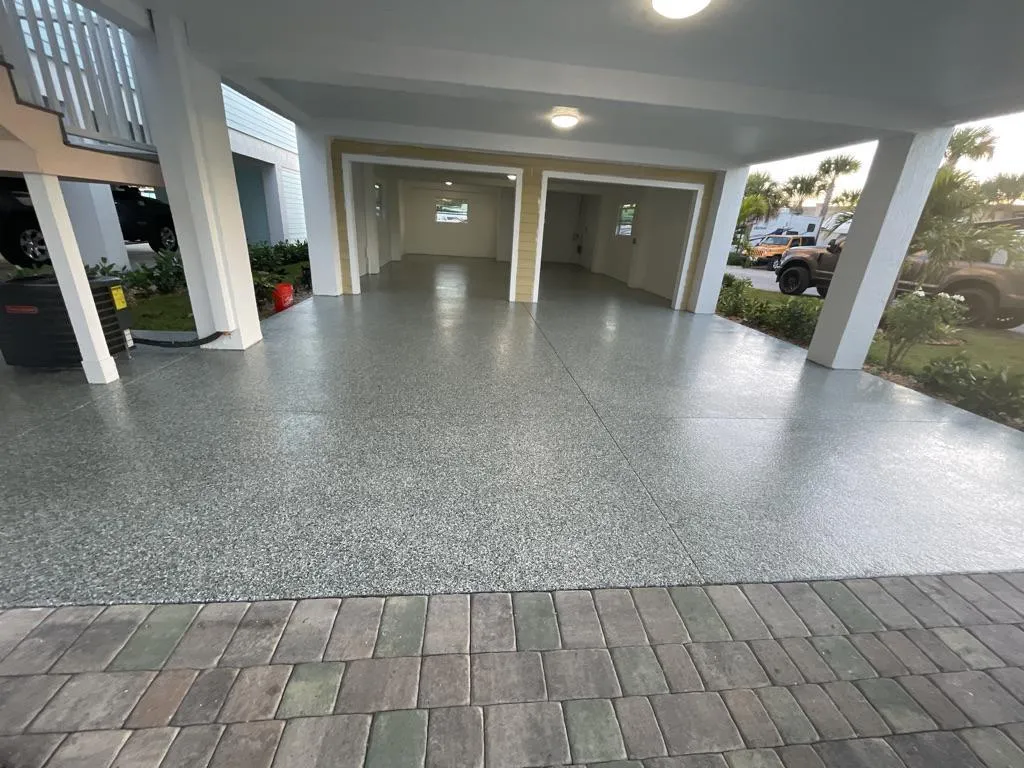Transform Your Home with Durable Epoxy Flooring & Polyaspartic Coating in Port St. Lucie, FL
The Perfect Flooring Solution for Your Home in Port St. Lucie, FL
Whether you're looking to upgrade your garage, basement, or patio, epoxy flooring and polyaspartic coating offer the perfect combination of durability, aesthetics, and low maintenance. At Floor Kings, we provide homeowners in Port St. Lucie, FL, with flooring solutions that are built to last and designed to fit your style.
Why Choose Epoxy Flooring for Your Home?
Durable and Customizable Flooring for Every Space
Epoxy flooring offers homeowners a versatile and long-lasting solution that enhances both the functionality and appearance of any space. Whether you're looking to upgrade your garage, basement, or living areas, epoxy floors provide a seamless surface that can withstand daily wear and tear while adding a sleek, modern touch to your home. Below are some of the key benefits of choosing epoxy flooring for your residence in Port St. Lucie:
Durability: Epoxy flooring is tough enough to handle heavy foot traffic and resistant to spills and stains, making it ideal for busy homes.
Low Maintenance: Easy to clean and maintain, epoxy floors retain their shine for years with minimal effort.
Customizable Design: Choose from a wide range of colors and textures, including metallic finishes and decorative flakes, to perfectly match your home’s aesthetic.
Moisture Resistance:
Great for basements and garages, epoxy flooring is highly resistant to moisture, preventing issues like mold or mildew.
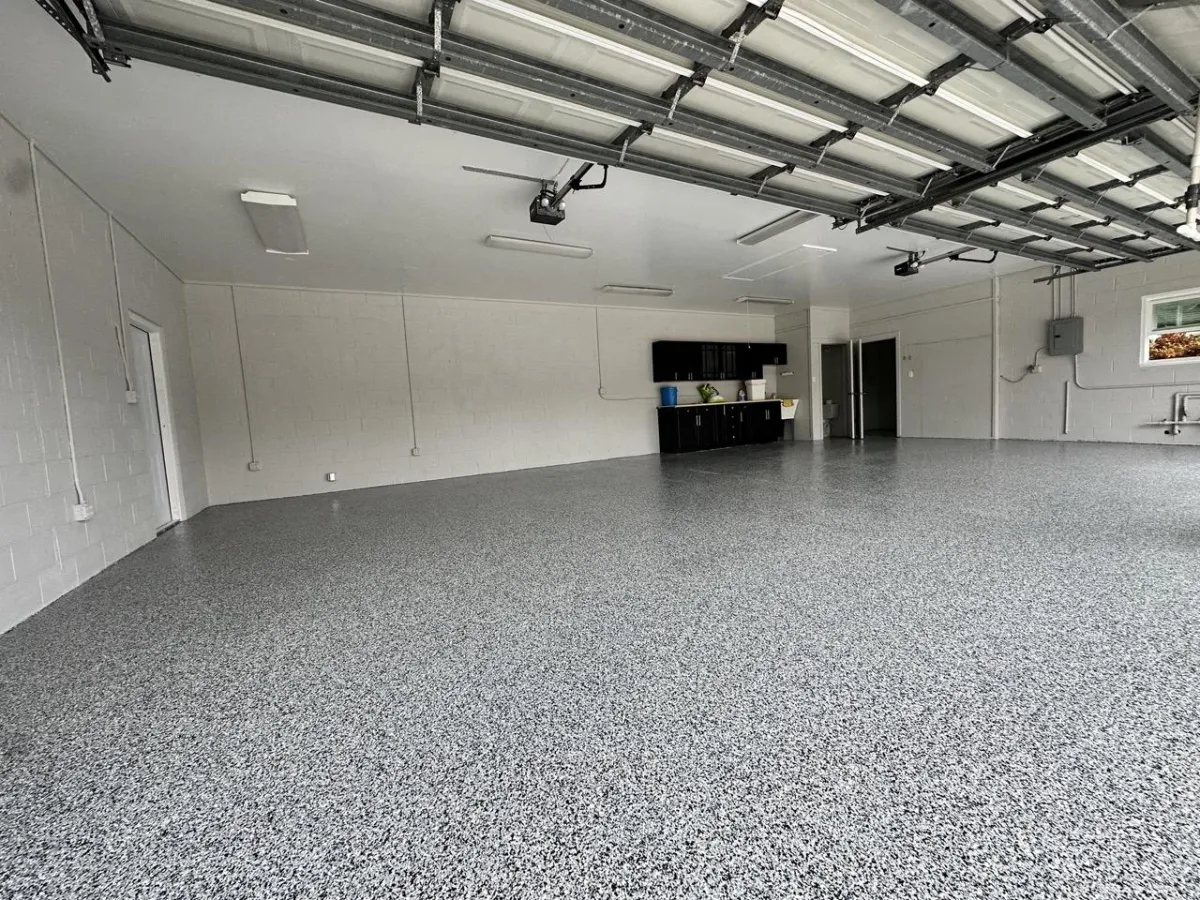
What is Polyaspartic Flooring and How Does it Compare to Epoxy Flooring?
While both epoxy flooring and polyaspartic coating are excellent options for residential spaces, they have distinct differences. Polyaspartic coatings offer faster curing times and UV resistance, making them ideal for outdoor applications like patios or pool decks. On the other hand, epoxy flooring is perfect for indoor areas that require a long-lasting, durable finish. Here are the main advantages of a Polyaspartic coating for your home:
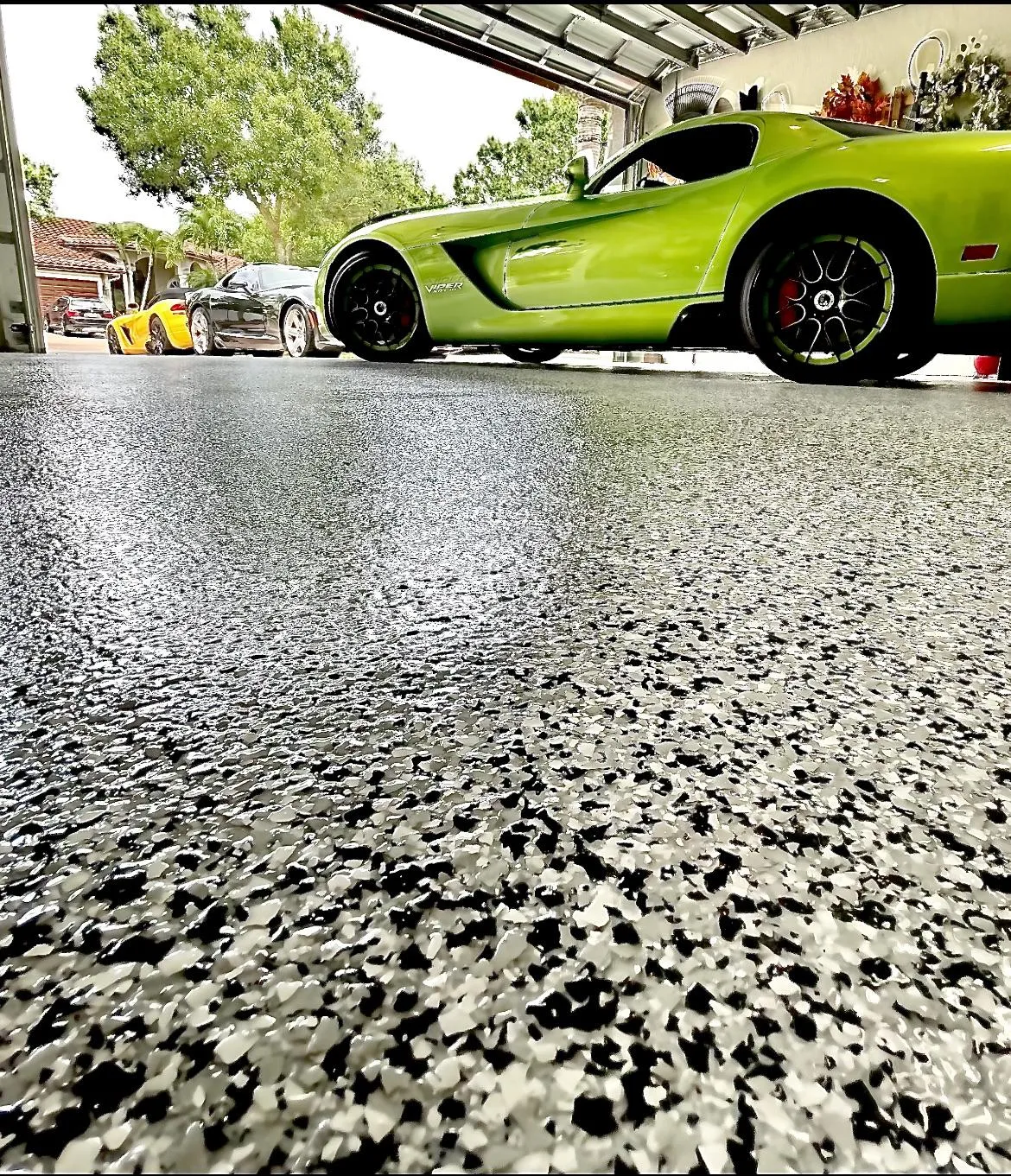
Faster Curing Time: Polyaspartic coatings cure much faster than epoxy, often in a few hours, allowing the space to be used sooner. In contrast, epoxy can take several days to fully cure.
UV Resistance: Polyaspartic is highly resistant to UV rays, preventing it from yellowing or fading when exposed to sunlight, which makes it better suited for outdoor or sunlit areas. Epoxy, on the other hand, can discolor over time if exposed to UV light.
Durability and Flexibility: Polyaspartic coatings are more flexible and less prone to cracking, which allows them to handle impact and temperature changes better than epoxy, making them longer-lasting in the high heat we experience in Port St. Lucie, Fl.
Chemical Resistance: Polyaspartic coatings have superior resistance to chemicals, oils, and salts compared to epoxy, making them ideal for spaces like garages and workshops where harsh chemicals may be present.
Where to Use Epoxy Flooring and Polyaspartic Coatings in Your Home
Durable and Customizable Flooring for Every Space
Garage Epoxy Flooring:
Epoxy flooring is a top choice for garages, providing a durable surface that resists oil spills, tire marks, and daily wear and tear. Its slip-resistant qualities make it a safe option for high-traffic areas like driveways and workshops.
Basement Epoxy Flooring:
Epoxy flooring is ideal for basements, offering superior moisture resistance, preventing mold and mildew, and creating a sleek, polished look that enhances the space. It’s perfect for turning your basement into a functional living area or home gym.
Patio & Pool Deck Polyaspartic Coating:
Polyaspartic coatings are perfect for outdoor areas like patios and pool decks, thanks to their UV resistance and quick curing time. They maintain their vibrant finish under the sun and protect your outdoor spaces from harsh weather and wear.
Garage Polyaspartic Coating:
For homeowners seeking a faster installation with superior chemical and scratch resistance, polyaspartic coatings are a great choice for garages. This coating is especially beneficial in spaces exposed to extreme temperatures or frequent chemical spills.
Living Room or Kitchen Epoxy Flooring:
Epoxy flooring can be used in living rooms and kitchens for a modern, high-gloss finish that enhances the aesthetic of your home. With a variety of colors and customizable designs, it offers a seamless look that’s both stylish and easy to clean.
Bathroom Polyaspartic Coating:
Polyaspartic coatings are great for bathrooms due to their moisture-resistant and non-slip properties. They provide an elegant finish that is easy to maintain while protecting against water damage and staining.
Epoxy Flooring for Workshops or Home Offices:
Epoxy flooring is ideal for workshops or home offices, where heavy furniture or equipment is used. Its durable surface resists scratches, stains, and heavy loads, while its customizable design options allow you to create a professional, polished look.
Epoxy Flooring and Polyaspartic Coating: A Perfect Match for Florida’s Climate
Florida's climate can be harsh on traditional flooring materials, but epoxy flooring and polyaspartic coatings are designed to withstand the humidity, heat, and UV exposure common in Port St. Lucie and surrounding areas. These coatings protect your floors from damage while offering a beautiful, seamless finish.
Here are some of our favorite past jobs from Port St. Lucie and the surrounding areas
Transform Your Port St. Lucie Home with Epoxy & Polyaspartic Flooring
Ready to enhance your home with durable, low-maintenance epoxy flooring or polyaspartic coatings? At Floor Kings, we’re proud to serve homeowners in Port St. Lucie, Fort Pierce, Stuart, and Palm City. Contact us today for a free estimate and see how we can transform your space.
The Floor Kings Difference
At Floor Kings, we know how overwhelming it can be to find a reliable and fairly priced flooring contractor. We've all heard the stories—hiring a handyman or an inexperienced crew that promises to cut corners and save you a few dollars, only to disappear once the check clears, leaving you with a subpar floor that won't stand the test of time. That's not how we do business.
flooring is our passion and our sole focus. Whether you're looking for a stunning polished concrete finish for your home, industrial strength epoxy flooring for your warehouse, or a durable concrete coating for a high-traffic area, our expertise is second to none. We don’t just dabble in flooring—we live and breathe it, bringing decades of experience and a commitment to excellence to every project.
Our Expertise, Your Peace of Mind
From residential garages to commercial warehouses and everything in between, we’ve seen and done it all. We specialize in transforming spaces through meticulous craftsmanship, using only top-grade materials designed for longevity. Our team’s experience means that we not only finish jobs on time, but we also ensure they’re done right—the first time. What makes the difference? Preparation.
Quality flooring starts with properly preparing the surface. We go beyond just applying epoxy coatings or polishing concrete; we take the time to prep each substrate carefully, ensuring a flawless, long-lasting result. Whether it’s a driveway, patio, airplane hangar, or commercial kitchen, we treat every project with the same level of dedication and expertise.
Quality Without Compromise
We believe that every customer deserves high-quality flooring without the hassle of inflated prices or unnecessary upsells. From day one, our pricing is transparent —no gimmicks, no fluff. Just honest work at a fair price. We’re upfront because we’ve built this business on trust and repeat customers, and we take that responsibility seriously.
When you choose Floor Kings, you’re not just getting a contractor; you’re getting a partner in your flooring journey. From start to finish, we work to make the process seamless and stress-free, ensuring that you're thrilled with the end result—whether it’s a polished concrete floor that gleams or an epoxy coating tough enough to handle the wear and tear of a busy warehouse.
The Floor Kings Difference
At Floor Kings, we know how overwhelming it can be to find a reliable and fairly priced flooring contractor. We've all heard the stories—hiring a handyman or an inexperienced crew that promises to cut corners and save you a few dollars, only to disappear once the check clears, leaving you with a subpar floor that won't stand the test of time. That's not how we do business.
flooring is our passion and our sole focus. Whether you're looking for a stunning polished concrete finish for your home, industrial strength epoxy flooring for your warehouse, or a durable concrete coating for a high-traffic area, our expertise is second to none. We don’t just dabble in flooring—we live and breathe it, bringing decades of experience and a commitment to excellence to every project.
Our Expertise, Your Peace of Mind
From residential garages to commercial warehouses and everything in between, we’ve seen and done it all. We specialize in transforming spaces through meticulous craftsmanship, using only top-grade materials designed for longevity. Our team’s experience means that we not only finish jobs on time, but we also ensure they’re done right—the first time. What makes the difference? Preparation.
Quality flooring starts with properly preparing the surface. We go beyond just applying epoxy coatings or polishing concrete; we take the time to prep each substrate carefully, ensuring a flawless, long-lasting result. Whether it’s a driveway, patio, airplane hangar, or commercial kitchen, we treat every project with the same level of dedication and expertise.
Quality Without Compromise
We believe that every customer deserves high-quality flooring without the hassle of inflated prices or unnecessary upsells. From day one, our pricing is transparent —no gimmicks, no fluff. Just honest work at a fair price. We’re upfront because we’ve built this business on trust and repeat customers, and we take that responsibility seriously.
When you choose Floor Kings, you’re not just getting a contractor; you’re getting a partner in your flooring journey. From start to finish, we work to make the process seamless and stress-free, ensuring that you're thrilled with the end result—whether it’s a polished concrete floor that gleams or an epoxy coating tough enough to handle the wear and tear of a busy warehouse.
Contact Us Today
If you're in search of durable, long-term flooring solutions, look no further. Floor Kings is here to deliver epoxy flooring, polished concrete, and concrete coatings that stand the test of time. Get in touch for a free estimate , and see why we’re trusted across Florida for delivering high-quality floors at competitive prices.
Call or TXT
Frequently Asked Questions
Have a question that isn't answered on our site? Write us in the chat
What is epoxy flooring?
Epoxy flooring is a high-performance surface created by applying a mixture of resin and hardener to concrete floors. When these two components chemically react, they form a rigid plastic material that bonds tightly to the surface. The result is a thick, durable, and seamless coating that is not only visually appealing but also highly resistant to wear and tear. Epoxy flooring is commonly used in industrial settings due to its toughness, but it's also gaining popularity in residential spaces like garages and basements for its glossy finish and customizable designs. Homeowners appreciate epoxy for its ability to transform dull concrete into a sleek, attractive surface.
How long does epoxy flooring last?
Epoxy flooring is known for its impressive lifespan, typically lasting between 5 to 10 years in residential settings with regular care and maintenance. In commercial or industrial environments, where the floors may be exposed to heavier traffic and more challenging conditions, epoxy can still last 2-3 years before requiring touch-ups or a new coat. Factors like foot traffic, exposure to sunlight, and the type of chemicals or oils the floor is exposed to will influence its longevity. Proper maintenance, such as regular cleaning and avoiding harsh chemicals, can extend the life of epoxy floors, helping them maintain their glossy appearance and structural integrity over time.
Can epoxy flooring be used in residential homes?
Yes, epoxy flooring is an excellent choice for residential homes, especially in areas that endure heavy foot traffic or exposure to spills and moisture, such as garages, basements, kitchens, and even laundry rooms. Epoxy is not only durable and resistant to damage but also customizable, available in a range of colors and finishes that allow homeowners to enhance the aesthetic appeal of their space. Homeowners often choose epoxy for its high-gloss finish, which adds a modern, polished look to otherwise plain concrete floors. Additionally, epoxy’s seamless surface makes it easy to clean and maintain, making it practical for family homes.
How should epoxy flooring be maintained?
Maintaining epoxy flooring is straightforward, which is one of the reasons it's such a popular choice for both homes and businesses. To keep your epoxy floor looking its best, start by sweeping or vacuuming regularly to remove dirt and debris. Mop the surface with a mild detergent and water, avoiding harsh or abrasive cleaners that could damage the glossy finish. For tougher stains, a gentle scrubbing with a soft-bristle brush should do the trick. Be cautious of dragging heavy objects across the surface, as this could cause scratches. With proper care, epoxy flooring will maintain its appearance and durability for years to come.
How long does epoxy flooring take to install?
The installation of epoxy flooring typically takes 2-3 days from start to finish, depending on the size and condition of the area. The process begins with thorough cleaning and preparation of the concrete surface, followed by the application of a primer and multiple layers of epoxy. Each layer needs time to cure before the next can be applied, which can take 12 to 24 hours. After the final coat, the epoxy will take an additional 72 hours to fully cure before the floor can handle heavy traffic. Although the process takes time, the result is a long-lasting, durable floor that’s well worth the wait.
Is epoxy flooring slippery?
While epoxy floors are smooth and glossy, they can become slippery when wet, especially in areas prone to spills or moisture, like garages or kitchens. However, there are ways to address this. Anti-slip additives, such as sand or aluminum oxide, can be mixed into the epoxy coating to create a textured surface that improves traction. Additionally, decorative flakes or chips can add both aesthetic value and slip resistance. For homeowners concerned about safety, especially in areas where children or elderly individuals may be walking, incorporating these non-slip elements into the epoxy finish is a practical and effective solution.
Can epoxy flooring be used outdoors?
Epoxy flooring is generally not recommended for outdoor use because it tends to degrade when exposed to direct sunlight over time. The UV rays can cause the epoxy to yellow, fade, and become brittle, reducing its durability. However, for covered outdoor areas like garages, it can still be a viable option. If you're looking for an outdoor flooring solution with similar benefits, polyaspartic coatings may be a better choice, as they are UV-resistant and more suited to withstand outdoor conditions like temperature changes and moisture exposure, all while maintaining their appearance and durability.
Is epoxy flooring heat-resistant?
Yes, epoxy flooring is highly resistant to heat, making it a suitable option for areas that may experience higher temperatures, such as kitchens, workshops, or garages where heat-generating equipment is used. Epoxy can typically withstand temperatures of up to 200°F (93°C) without suffering damage, and certain high-performance epoxies can endure even higher temperatures. However, it's essential to note that prolonged exposure to extreme heat may cause some degradation over time. For spaces where heat exposure is a significant concern, consulting with your installer about heat-resistant epoxy formulations can ensure the floor maintains its integrity and durability.
Can epoxy flooring be repaired?
Yes, minor damage to epoxy flooring, such as small cracks or chips, can be repaired without the need for a complete resurfacing. Repair kits are available that allow homeowners or professionals to fill in damaged areas and apply a fresh coat of epoxy to restore the floor’s seamless appearance. However, extensive damage or widespread wear may require reapplication of the epoxy to maintain a uniform look. Regular maintenance and addressing minor issues as they arise can help prevent the need for larger, more costly repairs. A professional installer can assess the damage and recommend the best course of action.
Is epoxy flooring eco-friendly?
While epoxy is a synthetic material and is not biodegradable, it can still be considered environmentally friendly in certain respects. Epoxy flooring increases the lifespan of concrete floors, reducing the need for frequent replacements, and it requires fewer harsh chemicals for cleaning. Additionally, some epoxy products are now formulated with low-VOC (volatile organic compounds), which means they emit fewer pollutants into the air during installation. For homeowners concerned about the environmental impact, choosing low-VOC epoxy options and practicing responsible maintenance can help reduce its ecological footprint.
What is polyaspartic coating?
Polyaspartic coating is a type of advanced polyurea-based floor coating that offers superior durability and fast curing times. Originally developed for industrial use, polyaspartic coatings have become a popular choice for residential applications due to their resistance to wear, chemicals, and UV light. Unlike traditional epoxy coatings, polyaspartic cures much faster, often within hours, allowing for quicker project completion. Its flexibility makes it suitable for a wide range of environments, from garages and basements to patios and pool decks.
How long does polyaspartic coating take to cure?
Polyaspartic coatings have an extremely fast curing time compared to epoxy. In most cases, they are fully cured within 24 hours, allowing you to resume normal use of the area quickly. In fact, some polyaspartic floors can be walked on within 4-6 hours and driven on in less than a day, depending on environmental conditions. This makes polyaspartic an excellent option for projects where minimal downtime is a priority.
Is polyaspartic coating UV-resistant?
Yes, one of the major advantages of polyaspartic coatings is their superior UV resistance. Unlike epoxy, which can yellow or fade when exposed to direct sunlight over time, polyaspartic coatings maintain their color and finish even in outdoor environments. This makes them an ideal choice for exterior surfaces such as patios, driveways, and pool decks, ensuring long-lasting visual appeal in areas exposed to the sun.
Can polyaspartic coatings be used indoors and outdoors?
Absolutely! Polyaspartic coatings are highly versatile and can be used in both indoor and outdoor applications. Indoors, they are popular for garage floors, basements, and even kitchens due to their durability and aesthetic appeal. Outdoors, polyaspartic is commonly applied to patios, driveways, and pool decks, where its UV resistance and durability help it stand up to weather and high foot traffic. The fast curing time also makes it ideal for projects where outdoor exposure is unavoidable.
Are polyaspartic coatings resistant to chemicals and stains?
Yes, polyaspartic coatings are highly resistant to chemicals, including automotive fluids, cleaning agents, and even harsh industrial chemicals. This makes them a great choice for garages, workshops, and other areas prone to spills. In addition to chemical resistance, polyaspartic coatings are also resistant to stains, ensuring that spills can be easily cleaned up without leaving a mark. Their non-porous nature prevents substances from seeping into the surface, maintaining the floor’s appearance over time.
Are polyaspartic coatings resistant to heat?
Yes, polyaspartic coatings are highly resistant to heat, making them an excellent choice for areas exposed to high temperatures, such as outdoor patios, driveways, and garages. Unlike some flooring materials that may soften or warp under prolonged exposure to heat, polyaspartic coatings maintain their structural integrity and finish even in hot climates. In regions like Port St. Lucie, Florida, where temperatures can rise significantly, polyaspartic coatings provide a durable, UV-resistant solution that won't fade or discolor under the sun. This heat resistance ensures long-term performance in both residential and commercial settings.
What is the maintenance required for polyaspartic flooring?
Polyaspartic flooring is incredibly low-maintenance. Regular sweeping and occasional mopping with a mild detergent are usually sufficient to keep the floor looking new. Thanks to its resistance to scratches, chemicals, and stains, polyaspartic requires less upkeep than other flooring options. Additionally, its seamless finish makes it easy to clean, as there are no grout lines or cracks where dirt can accumulate. It’s a long-lasting solution that minimizes time spent on maintenance.
Can polyaspartic coatings be customized?
Yes, polyaspartic coatings are highly customizable in terms of color, texture, and finish. Homeowners can choose from a wide variety of color options to match the aesthetic of their space. Decorative flakes, metallic finishes, and even custom patterns can be incorporated into the polyaspartic coating to achieve a unique look. This flexibility in design makes polyaspartic coatings ideal for both residential and commercial spaces that require a personalized touch.
Is polyaspartic flooring slip-resistant?
Yes, polyaspartic flooring can be formulated to be slip-resistant, which makes it a safe choice for high-traffic areas, garages, or outdoor spaces like pool decks and patios. During the installation process, an anti-slip additive can be mixed into the coating to provide additional traction, ensuring safety in wet or slick conditions. This feature is especially beneficial in environments where water or other liquids are commonly present.
How durable is polyaspartic compared to epoxy?
Polyaspartic coatings are known for their exceptional durability, often outperforming epoxy in key areas. They are more flexible, which makes them less prone to cracking or peeling, even under heavy use. Additionally, polyaspartic coatings have superior abrasion resistance, making them an excellent choice for high-traffic areas that are exposed to heavy machinery, vehicles, or frequent foot traffic. Their resistance to UV rays, chemicals, and moisture also ensures a longer-lasting finish, making polyaspartic a more durable and versatile option for many homeowners.
Frequently Asked Questions
Have a question that isn't answered on our site? Write us in the chat
What is epoxy flooring?
Epoxy flooring is a high-performance surface created by applying a mixture of resin and hardener to concrete floors. When these two components chemically react, they form a rigid plastic material that bonds tightly to the surface. The result is a thick, durable, and seamless coating that is not only visually appealing but also highly resistant to wear and tear. Epoxy flooring is commonly used in industrial settings due to its toughness, but it's also gaining popularity in residential spaces like garages and basements for its glossy finish and customizable designs. Homeowners appreciate epoxy for its ability to transform dull concrete into a sleek, attractive surface.
How long does epoxy flooring last?
Epoxy flooring is known for its impressive lifespan, typically lasting between 5 to 10 years in residential settings with regular care and maintenance. In commercial or industrial environments, where the floors may be exposed to heavier traffic and more challenging conditions, epoxy can still last 2-3 years before requiring touch-ups or a new coat. Factors like foot traffic, exposure to sunlight, and the type of chemicals or oils the floor is exposed to will influence its longevity. Proper maintenance, such as regular cleaning and avoiding harsh chemicals, can extend the life of epoxy floors, helping them maintain their glossy appearance and structural integrity over time.
Can epoxy flooring be used in residential homes?
Yes, epoxy flooring is an excellent choice for residential homes, especially in areas that endure heavy foot traffic or exposure to spills and moisture, such as garages, basements, kitchens, and even laundry rooms. Epoxy is not only durable and resistant to damage but also customizable, available in a range of colors and finishes that allow homeowners to enhance the aesthetic appeal of their space. Homeowners often choose epoxy for its high-gloss finish, which adds a modern, polished look to otherwise plain concrete floors. Additionally, epoxy’s seamless surface makes it easy to clean and maintain, making it practical for family homes.
How should epoxy flooring be maintained?
Maintaining epoxy flooring is straightforward, which is one of the reasons it's such a popular choice for both homes and businesses. To keep your epoxy floor looking its best, start by sweeping or vacuuming regularly to remove dirt and debris. Mop the surface with a mild detergent and water, avoiding harsh or abrasive cleaners that could damage the glossy finish. For tougher stains, a gentle scrubbing with a soft-bristle brush should do the trick. Be cautious of dragging heavy objects across the surface, as this could cause scratches. With proper care, epoxy flooring will maintain its appearance and durability for years to come.
How long does epoxy flooring take to install?
The installation of epoxy flooring typically takes 2-3 days from start to finish, depending on the size and condition of the area. The process begins with thorough cleaning and preparation of the concrete surface, followed by the application of a primer and multiple layers of epoxy. Each layer needs time to cure before the next can be applied, which can take 12 to 24 hours. After the final coat, the epoxy will take an additional 72 hours to fully cure before the floor can handle heavy traffic. Although the process takes time, the result is a long-lasting, durable floor that’s well worth the wait.
Is epoxy flooring slippery?
While epoxy floors are smooth and glossy, they can become slippery when wet, especially in areas prone to spills or moisture, like garages or kitchens. However, there are ways to address this. Anti-slip additives, such as sand or aluminum oxide, can be mixed into the epoxy coating to create a textured surface that improves traction. Additionally, decorative flakes or chips can add both aesthetic value and slip resistance. For homeowners concerned about safety, especially in areas where children or elderly individuals may be walking, incorporating these non-slip elements into the epoxy finish is a practical and effective solution.
Can epoxy flooring be used outdoors?
Epoxy flooring is generally not recommended for outdoor use because it tends to degrade when exposed to direct sunlight over time. The UV rays can cause the epoxy to yellow, fade, and become brittle, reducing its durability. However, for covered outdoor areas like garages, it can still be a viable option. If you're looking for an outdoor flooring solution with similar benefits, polyaspartic coatings may be a better choice, as they are UV-resistant and more suited to withstand outdoor conditions like temperature changes and moisture exposure, all while maintaining their appearance and durability.
Is epoxy flooring heat-resistant?
Yes, epoxy flooring is highly resistant to heat, making it a suitable option for areas that may experience higher temperatures, such as kitchens, workshops, or garages where heat-generating equipment is used. Epoxy can typically withstand temperatures of up to 200°F (93°C) without suffering damage, and certain high-performance epoxies can endure even higher temperatures. However, it's essential to note that prolonged exposure to extreme heat may cause some degradation over time. For spaces where heat exposure is a significant concern, consulting with your installer about heat-resistant epoxy formulations can ensure the floor maintains its integrity and durability.
Can epoxy flooring be repaired?
Yes, minor damage to epoxy flooring, such as small cracks or chips, can be repaired without the need for a complete resurfacing. Repair kits are available that allow homeowners or professionals to fill in damaged areas and apply a fresh coat of epoxy to restore the floor’s seamless appearance. However, extensive damage or widespread wear may require reapplication of the epoxy to maintain a uniform look. Regular maintenance and addressing minor issues as they arise can help prevent the need for larger, more costly repairs. A professional installer can assess the damage and recommend the best course of action.
Is epoxy flooring eco-friendly?
While epoxy is a synthetic material and is not biodegradable, it can still be considered environmentally friendly in certain respects. Epoxy flooring increases the lifespan of concrete floors, reducing the need for frequent replacements, and it requires fewer harsh chemicals for cleaning. Additionally, some epoxy products are now formulated with low-VOC (volatile organic compounds), which means they emit fewer pollutants into the air during installation. For homeowners concerned about the environmental impact, choosing low-VOC epoxy options and practicing responsible maintenance can help reduce its ecological footprint.
What is polyaspartic coating?
Polyaspartic coating is a type of advanced polyurea-based floor coating that offers superior durability and fast curing times. Originally developed for industrial use, polyaspartic coatings have become a popular choice for residential applications due to their resistance to wear, chemicals, and UV light. Unlike traditional epoxy coatings, polyaspartic cures much faster, often within hours, allowing for quicker project completion. Its flexibility makes it suitable for a wide range of environments, from garages and basements to patios and pool decks.
How long does polyaspartic coating take to cure?
Polyaspartic coatings have an extremely fast curing time compared to epoxy. In most cases, they are fully cured within 24 hours, allowing you to resume normal use of the area quickly. In fact, some polyaspartic floors can be walked on within 4-6 hours and driven on in less than a day, depending on environmental conditions. This makes polyaspartic an excellent option for projects where minimal downtime is a priority.
Is polyaspartic coating UV-resistant?
Yes, one of the major advantages of polyaspartic coatings is their superior UV resistance. Unlike epoxy, which can yellow or fade when exposed to direct sunlight over time, polyaspartic coatings maintain their color and finish even in outdoor environments. This makes them an ideal choice for exterior surfaces such as patios, driveways, and pool decks, ensuring long-lasting visual appeal in areas exposed to the sun.
Can polyaspartic coatings be used indoors and outdoors?
Absolutely! Polyaspartic coatings are highly versatile and can be used in both indoor and outdoor applications. Indoors, they are popular for garage floors, basements, and even kitchens due to their durability and aesthetic appeal. Outdoors, polyaspartic is commonly applied to patios, driveways, and pool decks, where its UV resistance and durability help it stand up to weather and high foot traffic. The fast curing time also makes it ideal for projects where outdoor exposure is unavoidable.
Are polyaspartic coatings resistant to chemicals and stains?
Yes, polyaspartic coatings are highly resistant to chemicals, including automotive fluids, cleaning agents, and even harsh industrial chemicals. This makes them a great choice for garages, workshops, and other areas prone to spills. In addition to chemical resistance, polyaspartic coatings are also resistant to stains, ensuring that spills can be easily cleaned up without leaving a mark. Their non-porous nature prevents substances from seeping into the surface, maintaining the floor’s appearance over time.
Your Title Here
Yes, polyaspartic coatings are highly resistant to heat, making them an excellent choice for areas exposed to high temperatures, such as outdoor patios, driveways, and garages. Unlike some flooring materials that may soften or warp under prolonged exposure to heat, polyaspartic coatings maintain their structural integrity and finish even in hot climates. In regions like Port St. Lucie, Florida, where temperatures can rise significantly, polyaspartic coatings provide a durable, UV-resistant solution that won't fade or discolor under the sun. This heat resistance ensures long-term performance in both residential and commercial settings.
What is the maintenance required for polyaspartic flooring?
Polyaspartic flooring is incredibly low-maintenance. Regular sweeping and occasional mopping with a mild detergent are usually sufficient to keep the floor looking new. Thanks to its resistance to scratches, chemicals, and stains, polyaspartic requires less upkeep than other flooring options. Additionally, its seamless finish makes it easy to clean, as there are no grout lines or cracks where dirt can accumulate. It’s a long-lasting solution that minimizes time spent on maintenance.
Can polyaspartic coatings be customized?
Yes, polyaspartic coatings are highly customizable in terms of color, texture, and finish. Homeowners can choose from a wide variety of color options to match the aesthetic of their space. Decorative flakes, metallic finishes, and even custom patterns can be incorporated into the polyaspartic coating to achieve a unique look. This flexibility in design makes polyaspartic coatings ideal for both residential and commercial spaces that require a personalized touch.
Is polyaspartic flooring slip-resistant?
Yes, polyaspartic flooring can be formulated to be slip-resistant, which makes it a safe choice for high-traffic areas, garages, or outdoor spaces like pool decks and patios. During the installation process, an anti-slip additive can be mixed into the coating to provide additional traction, ensuring safety in wet or slick conditions. This feature is especially beneficial in environments where water or other liquids are commonly present.
How durable is polyaspartic compared to epoxy?
Polyaspartic coatings are known for their exceptional durability, often outperforming epoxy in key areas. They are more flexible, which makes them less prone to cracking or peeling, even under heavy use. Additionally, polyaspartic coatings have superior abrasion resistance, making them an excellent choice for high-traffic areas that are exposed to heavy machinery, vehicles, or frequent foot traffic. Their resistance to UV rays, chemicals, and moisture also ensures a longer-lasting finish, making polyaspartic a more durable and versatile option for many homeowners.
Residential
Commercial/Industrial
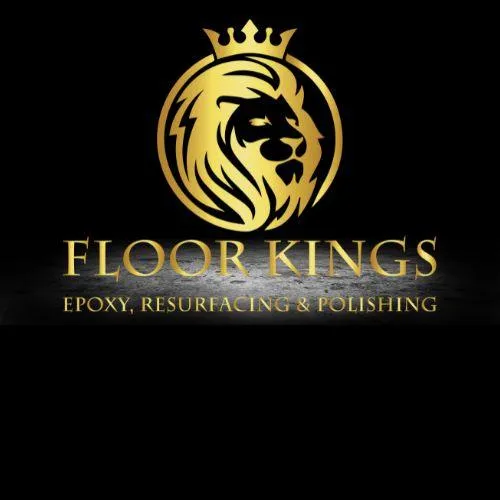
Residential
Commercial/Industrial

Areas We Serve:
Vero Beach
Jensen Beach
Hobe Sound
Port Salerno
